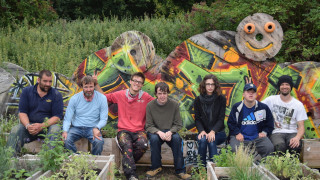
ACESTA is the Anthroposophical Care Education and Social Therapy Association
What does the word ACESTA stand for?
In the centre: Care, Education and Social Therapy; and holding them on either side: Association and Anthroposophy.
Both give ACESTA its stamp and essential nature:
Association: to work together out of Anthroposophy
Anthroposophy: a commitment to work together out of the image of the human being and to learn about what it means to be or to become human.
Within these is lovingly held the purpose of our work: Care, Education and Social Therapy of- and with- fellow human beings, who- within their present state -have complex needs of one kind or another.
What does the ACESTA do:
We meet twice a year.
Organise annual or biannual conferences and/or symposia.
Provide links to and work together with partners from a wide variety of therapeutic disciplines and streams within the social care movement.
Are building an archive of notable contributions for wider distribution.
Support the publication of new and unpublished material.
Maintain a website for members and the public.
Disseminate and provide a platform for the sharing of information.
Encourage research, developing a working relationship across the Sections of the School of Spiritual Science.
History
The original task of this Association was to provide a publicly recognisable organisation under the umbrella of what was then called the Anthroposophic Health Professions Council, and subsequently became CAHSC, the Council for Anthroposophical Health and Social Care.
We had hoped that we would be able to have voluntary registration of all the various professions contained within the Council. Dr David McGavin, Jack Reed, Simon and Paulamaria Blaxland-de Lange, Charles Reynolds, Dr Maria van den Berg, Edeline LeFevre, Johanna Baker, Piet Blok, Christiane Bryan, Angela Ralph and Simon Fielding and many others were active in that early time.
Although this did not in the end come about, many of the professions had started their own professional associations where people met and worked together. Since its inception in 2003 ACESTA has been one of the associations remaining active, meeting regularly, and supporting representation to Dornach and Kassel as well as the English speaking ECCE (European Co-operation for Curative Education and Social Therapy) and the German speaking STAG (Social Therapy Working Group).
When some years ago we began to ask ourselves what ACESTA had to offer and whether it was still relevant, we realised that it was the only associate group left that brought us all together, whether we were Education, Care or Social therapy including its many and varied disciplines, be it Camphill or otherwise. We also experienced that something took place in our meetings that could not so easily be talked about afterwards, but nevertheless influenced and showed itself in much of what then became possible and visible. Then the Committee for Steiner Special Education decided to join ACESTA and kindly donated their remaining funds which made much possible, while breaking the last remaining barrier between the different streams within the movement.
So, the decision was made that we would remain active and encourage new areas of work and membership. Apart from ongoing meetings and small gatherings, several initiatives of note could be mentioned that came out of this:
In 2014 ACESTA hosted the AGM of the ECCE and a festive international conference celebrating 90 years of Curative Education and Social Therapy at Emerson College, with Richard Steel and Michael Luxford and many others.
An ACESTA symposium took place at Nutley Hall in 2016, where younger people who had begun to take over responsibility of areas within their communities and places, together with residents and students, spoke of their dreams and hopes for the future of their places but also for the whole of the movement. The day was facilitated by Dorota Owen from the Eco-Village Network and Findhorn and was an inclusive meeting.
In May 2017 there was an international conference at Emerson College for Biodynamic Farmers and Gardeners organised by Acesta and the Social Therapy Working Group (STAG) and supported by the Ruskin Mill Educational Trust and the Biodynamic Association with the theme: What can Biodynamic work and Social Therapy, Care and Education offer each other? Opportunities and Challenges
In 2018 there was a symposium at The Lantern Community with Bart van Mechelen, and later that year and in 2019 there were two larger ACESTA conferences with that year, both at Emerson College with Joan Sleigh, Richard Steel, Aonghus Gordon, Bart van Mechelen, Greg Tricker, Wendy Cook, Inessa Burdich, Jon Geelmuyden, Hartwig Ehlers and Michael Evans and others contributing, with some unforgettable moments.
At the request from members an archive of people’s contributions was started and ACESTA began in a small way to support publications and translations of unpublished and new material in collaboration with the Council in Dornach and the Social Therapy Working Group. Through the active membership of the ECCE we were founder members of ELIANT with Michaela Gloeckler and of the EDF and the EASPD in Europe (European Disability Forum and the European Association of Service Providers and helped work on the new white paper on human rights for people with complex needs brought out by the United Nations. ECCE has been a major support framework for the development of the Inclusive Congresses for and with people with complex needs.
The STAG, the Social Therapy Working Group comes together twice a year, once for study and research and once for active observation in social therapeutic places around Europe. On this basis, it worked on and brought out the paper on Anthroposophical Social Therapy, which can be found in the archive.
In the present situation, now in 2020, much work has continued that has had to be distance-based via zoom, skype, telephone or letter. Meetings have continued, papers and books have been written, inner work has taken place. Care has been given. Much water has flowed under the bridge: soul searching, medical research, social upheaval, trauma, learning, and new paradigms. The last ACESTA conference with the name of "Courage Love and Meaning, Tools for Resilience in the Here and Now” had to be postponed, but there could not have been a better title of what was and is needed.
It is and will be ever more important to associate, collaborate and co-operate within these new paradigms.
